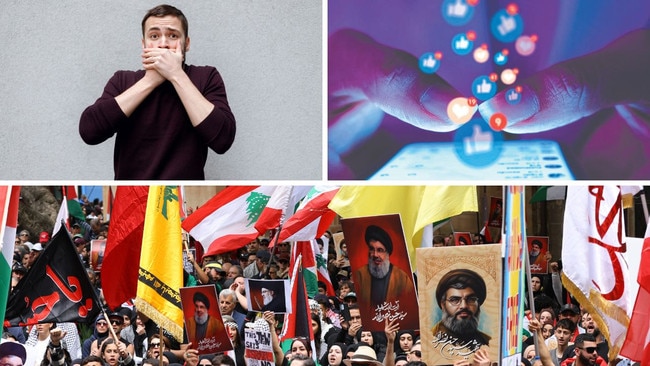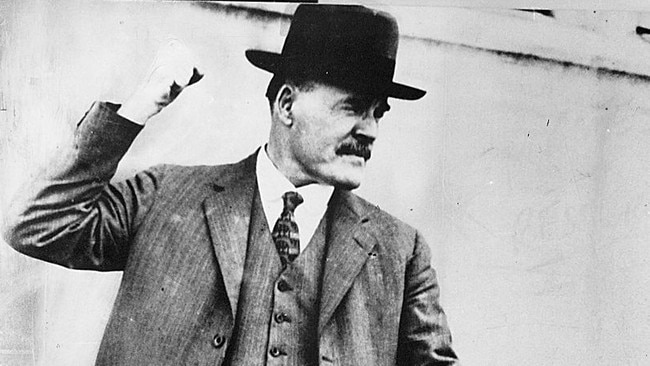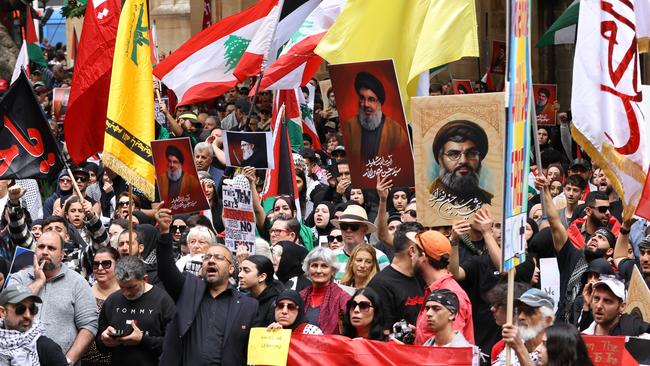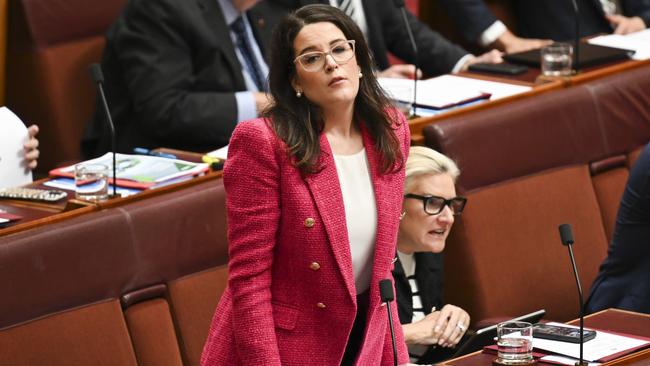
The Albanese government wants laws to force tech giants to erase false or misleading posts and the Coalition has mooted toughening laws to ban protesters carrying the symbols of outlawed terror groups.
Both are well-intentioned, address serious problems and sound reasonable. Who could be in favour of misinformation? Why would a sane person tolerate those glorifying the murderous thugs of Hamas and Hezbollah?
Free speech is hard. It means tolerating intolerable views in the hope that robust debate is the best defence of democracy. All too often governments have chipped away at freedoms under the pretence of defending us, usually in the name of human rights or national security.
When you crimp or criminalise words and symbols, a tiny piece of freedom is handed to a bureaucrat to arbitrate. Some misinformation is clear cut, but much is in the eye of the beholder. Experience shows that once the responsibility for free expression is taken from individuals, and delegated to human rights bureaucracies, it is unlikely to be restored. Usually, the provisions get extended as activists and officials discover ever more esoteric victims and offences.
The line between tackling security threats and policing political expression is also a fine one, and the risk of overreach is high. What makes for a secure, democratic nation can also be a matter of opinion.
In his book, I Remember, former NSW premier and Labor’s troublesome priest, Jack Lang, recalled the World War I home front battle over conscription, perhaps the biggest threat to social cohesion this nation has ever faced. The heart of the argument was: Should a man be forced to go to war against his will?
“Of all the many schisms, none had a more devastating effect on the Labor Party than the conscription crisis of 1916,” Lang wrote. “It was an amazing struggle. All the acknowledged leaders deserted the Labor Party. At the same time people flocked to Labor’s banner who had always voted against the party. Even families were divided. Political passions reached new heights of fury. Some reputations were destroyed overnight. Others were just as quickly made. Money to fight conscription poured in from undisclosed sources. Intimidation and victimisation were rife. Justice was ignored. This country had all the elements of a dictatorship.”

Lang was attacked in his electorate of Granville with “a whispering campaign that I was pro-German”.
“To make matters worse, the Easter Rebellion in Dublin had stirred up the sectarian issue in Melbourne. Dr (Daniel) Mannix, at that time the Coadjutor-Archbishop … became the anti-conscription leader. (Prime minister Billy) Hughes was shrewd enough to make him his principal adversary, raising the cry of Sinn Fein. So every anti-conscriptionist had to stand up to the challenge of being a Sinn Feiner as well.”
A majority of Australians voted against conscription, twice. Were the majority wrong or unpatriotic? Or did they see the essence of a democracy as the right to choose your own destiny.
Wind forward just four years to the story of Hugh Mahon. The firebrand journalist and Irish-Catholic patriot is the only member of federal parliament ever expelled by a vote of his colleagues. It came after a speech Mahon gave in late 1920 where he savagely attacked the British government and the empire for “this bloody and accursed despotism”.
What stirred Mahon to rage was the death of Terence McSwiney, playwright, author and lord mayor of Cork in Ireland. McSwiney died after 74 days of a hunger strike in Brixton Prison, where he was serving a sentence for possessing “seditious articles and documents”.
The Australian Dictionary of Biography records that Mahon’s speech “created a sensation and led to hostile demonstrations in Melbourne. Citing ‘seditious and disloyal utterances’, on 11 November Hughes introduced a motion in parliament calling for Mahon’s expulsion. Though he contested the details Mahon refused to defend himself in parliament, and, after an extended and passionate debate, he was formally expelled from the House in a procedure unique in the history of the commonwealth parliament”.

Times change. What seems like good law now might be a bad one in the hands of a future government. As Opposition Leader Peter Dutton has pointed out, the laws to deal with those displaying the symbols of terrorist organisations already exist. They should be enforced, not extended. The people carrying the symbols of Hamas and Hezbollah condemn themselves in the eyes of all right-thinking Australians. Making martyrs of them is doing them a favour.
More concerning is the latest push to appoint another bureaucracy, in this case the Australian Media and Communications Authority, arbiter of right and wrong words online. Among the wrongs it seeks to expunge from social media platforms is “harm to public health in Australia, including the efficacy of preventive health measures”.
With Covid an all too fresh memory, the idea that a bureaucracy would have even more scope to stifle debate in a health crisis is chilling.
Governments made many bad calls during the pandemic, none more so than Victoria, which had both the world’s longest lockdowns and the nation’s worst public health outcomes. Criticism of its draconian “preventive health measures” was a public service performed by too few in the media.
Then there is this: “Vilification of a group in Australian society distinguished by race, religion, sex, sexual orientation, gender identity, intersex status, disability, nationality or national or ethnic origin, or vilification of an individual because of a belief that the individual is a member of such a group.”
It’s hard to know where to begin on the grievance list. But since sex now has three subsections, let’s make one point on it.
Recall that in 2020, Liberal senator Claire Chandler wrongspoke in the pages of Tasmania’s Mercury when she said: “You don’t have to be a bigot to recognise the differences between the male and female sexes and understand why women’s sports, single-sex change rooms and toilets are important.”

In response to this once entirely unremarkable statement, the word police in Tasmania’s Anti-Discrimination Commission drew the longest of bows. It determined that “a reasonable person is likely to anticipate that a person who is a member of the LGBTIQ+ and gender-diverse community would be humiliated, intimidated, offended and insulted” by it. Chandler was invited to attend a “conciliation conference”.
Free speech in Australia already has enough boundaries drawn around it, and enough quasi-judiciaries. We don’t need any more.
Thirty years ago this week, writing for The Canberra Times, I argued, unsuccessfully, against the Keating government’s racial vilification bill. It concluded: “Whatever the real or imagined sins of our fathers and mothers, Australia in the 1990s is among the world’s most tolerant nations and it got that way not because of the efforts of the Human Rights Commission but because it was built on the foundation laid by the currency lads and lasses who are vilified by our ruling elites as quaint, cultureless, racist invaders.”
Thirty years on we are less free than we were. Let’s not make it worse.






Sometimes it seems the only thing that separates the left and right are the things they want to ban.